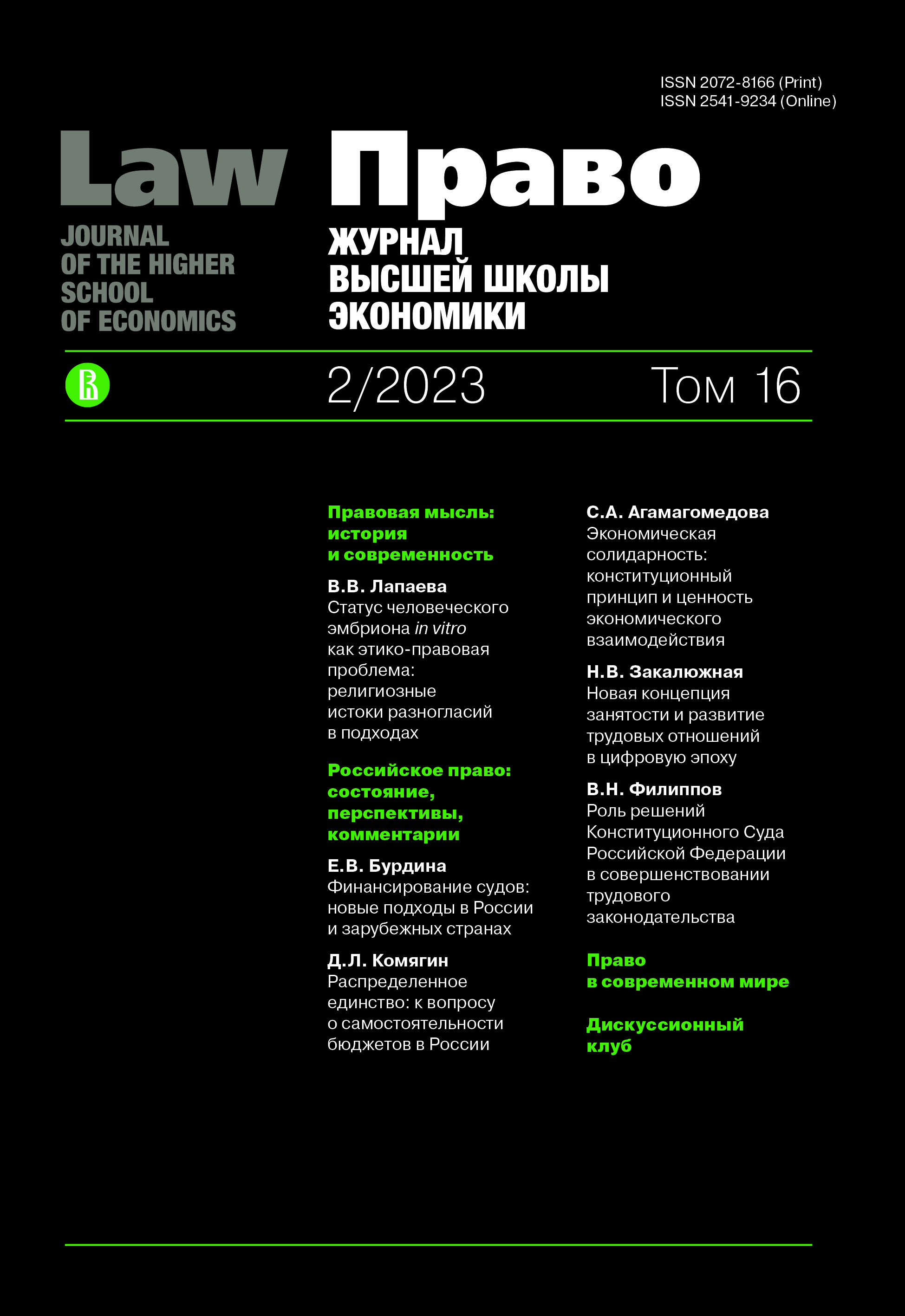Статус человеческого эмбриона in vitro как этико-правовая проблема: религиозные истоки разногласий в подходах
Аннотация
Предметом исследования статьи является вопрос об онтологическом статусе человеческого эмбриона in vitro, от решения которого зависит определение его морального и правового статуса, имеющее исключительно важное значение для этико-правового регулирования манипуляций с эмбрионами в процессе исследований и в клиническом применении вспомогательных репродуктивных технологий. Различные подходы к решению проблемы статуса эмбриона, исторически сложившиеся в разных странах и регионах мира, автор рассматривает в плоскости религиозной антропологии. Обосновывается тезис о том, что сформировавшаяся в рамках христианской культуры идея богоподобия человека, давшая мощный импульс научно-технологическому прогрессу, изначально содержала в себе глубинные мировоззренческие предпосылки, способные заблокировать возможность наиболее опасных вторжений в природу человека. Одна из таких предпосылок заключается в положении о том, что человеческий эмбрион с момента своего зачатия является одухотворенной личностью. Эта содержащаяся в глубинах христианского мировоззрения интенция к признанию человеческого зародыша личностью актуализировалась в последние десятилетия ХХ в. под влиянием легализации абортов и возможности развития эмбриона в лабораторных условиях, его криоконсервации, манипулирования с его генами вплоть до перспективы генетического совершенствования будущего ребенка. В результате сложилась ситуация, когда страны, культурная матрица которых не содержит подобных морально-религиозных ограничителей, в условиях прогресса научно-технологической сферы получают преимущества в глобальной конкуренции, которая в определенном смысле имеет цивилизационный характер. Это обстоятельство стало одним из факторов, способствующих наметившимся изменениям в международном этико-правовом регулировании, определяющем границы генетических исследований эмбрионального развития человека. Главный вектор изменений задан ослаблением прежних ограничений, истоки которых восходят к догматам христианского миропонимания. Последние новации в этой сфере демонстрируют стремление медико-биологического сообщества разделить ответственность за выработку регуляторной политики в области исследований человеческого эмбриона с деятелями других отраслей науки и с широкой общественностью.
Литература
Al'bitskiy V. Yu. et al. (2011) Legal aspects of the use of assisted reproductive technologies in the treatment of infertility. Voprosy sovremennoy pediatrii=Issues of Modern Pediatry, no.10, pp. 12-14 (in Russ.)
Chogovadze A.G. (2012) Peculiarities of legislative regulation of preimplantation diagnostics in different countries. Geny i kletki=Gens and Cells, no. 2, pp.112-118 (in Russ.)
Darnovsky M. et al. (2020) Heritable human genome editing is not inevitable. Trends in Biotechnology, vol.38, no. 4, pp. 3-5.
Daudna D., Stenberg S. (2019). A crack in the universe. Moscow: AST, 384 p. (in Russ.)
Druzhinina Yu. F. (2017) Legal regime of the embryo in vitro. Zhurnal rossiyskogo prava=Journal of Russian Law, no. 12, pp.129-140 (in Russ.) DOI: https://doi.org/10.12737/article_5a200506899599.19842755
Einstein A. (1956) Science and Religion. In: Out of my later years. Englewood Cliffs (N.J.): Citadel Press, pp. 21-30.
Grebenshchikova Ye. G. (2021) Editing the genome of human embryos. Vestnik RAMN=Bulletin of Russian Academy of Medicine, no. 1, pp. 86-92 (in Russ.) DOI: https://doi.org/10.15690/vramn1269
Joy M. et al. (2019) CCR5 is a therapeutic target for recovery after stroke and traumatic brain injury. Cell, no. 5, pp. 1143-1157. DOI: https://doi.org/10.1016/j.cell.2019.01.044
Kim H., Joly J. (2020) Regulation of human germline genome modification in Republic of Korea. In: Human germline genome modification and the right to science. A comparative study of national laws and policies. A. Boggio et al. (eds.). Cambridge: University Press, pp. 500-515. DOI: https://doi.org/10.1017/9781108759083.019
Kir'yanov D. (2020) The moral status of the human embryo in an inter-Christian context. Gosudarstvo, religiya, tserkov' v Rossii i za rubezhom=State, Religion and Church in Russia and abroad, vol. 38, no. 4, pp. 169-194 (in Russ.) DOI: https://doi.org/10.22394/2073-7203-2020-38-4-169-194
Momotov V.V. (2018) Bioethics in the context of legislation and law enforcement (assisted reproductive technologies). Rossiyskoye pravosudiye=Russian Justice, no. 2, pp. 42-52 (in Russ.) DOI: https://doi.org/10.17238/issn2072-909X.2018.12.42-52
Rorti R. (1994) Philosophy and the future. Voprosy filosofii=Issues of Philosophy, no. 6, pp. 29-34 (in Russ.)
Posulikhina N.S. (2021) Legal regimes for the development of genetic technologies in medicine: experience of foreign countries. Aktual'nyye problemy rossiyskogo prava=Issues of Russian Law, vol. 16, no. 1, pp. 167-180 (in Russ.) DOI: https://doi.org/10.17803/1994-1471.2021.122.1.167-180
Stepin V.M. (2011) Civilization and culture. Saint Petersburg: University Press, 407 p. (in Russ.)
Vlasov G.D. (2022) Regulation of research in the field of genetic engineering in East Asia (China, Japan, Korea). Informatsionno-analiticheskiy zhurnal. Seriya Gosudarstvo i pravo=Information and Analytical Journal Series State and Law, no. 4, pp. 20-31 (in Russ.) DOI: https://doi.org/10.31249/rgpravo/2022.04.02
Watts G. (2019) Helen Mary Warnock. Obitiary. The Lancet, vol. 393, May 25, p. 2118. DOI: https://doi.org/10.1016/S0140-6736(19)31091-8
Woods T. (2010) How the Catholic Church Created Western Civilization. Moscow: IRISEN, 280 p. (in Russ.)
Zhuravleva Ye.M. (2012) Nasciturus in terms of the legal status of the embryo (fetus). In: Law and order in modern society. Papers of a scholar conference. Novosibirsk: University Press, pp. 24-30 (in Russ.)
Copyright (c) 2023 Право. Журнал Высшей школы экономики

Это произведение доступно по лицензии Creative Commons «Attribution-ShareAlike» («Атрибуция — На тех же условиях») 4.0 Всемирная.


















